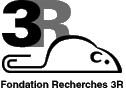
Hanno Würbel1
Institute of Laboratory Animal Science, University of Zurich, 8057 Zurich, Switzerland
1present address:
Veterinary Public Health-Institut, Vetsuisse-Faculty, University of Bern, 3012 Bern, Switzerland
hanno.wuerbel@vetsuisse.unibe.ch
Keywords: mice; ethology: laboratory animals; reduction; refinement; standardization
Duration: 1 year Project Completion: 2004
Background and Aim
Increasingly precise molecular genetic and pharmacological tools are available to study the cellular mechanisms underlying complex brain functions in mice. Because the brain is ultimately responsible for the generation of adaptive behaviour, brain functions need to be defined in terms of behaviour. Thus, behavioural phenotyping following neural manipulation plays a crucial role in the study of brain functions. However, minor environmental differences between laboratories or between replicate studies within a single laboratory may cause fundamental differences in the behavioural expression of neural manipulations. Thus, behavioural phenotypes may be idiosyncratic to particular studies and, therefore, be of limited scientific validity. Growing evidence suggests that poor housing conditions might play a role here, since they seem to enhance sensitivity to environmental fluctuations that resist standardization (see also 3R-Project 66-99). This project consists of a systematic assessment in mice to determine (i) the reproducibility of genetic differences in behaviour and underlying gene expression in independent replicate experiments both within and between laboratories and (ii) whether improved housing conditions reduce the risk of obtaining idiosyncratic results.
Method and Results
Two transgenic lines of mice - one with mild, the other with moderate neurological and behavioural changes compared to wild type controls - will be bred in a central breeding facility. After weaning at 21 days of age, samples of both male and female transgenic animals and wild type littermates will be distributed to three independent test laboratories, where they will be housed in groups of four in either barren standard laboratory cages or in large enriched environments. When the animals reach adulthood, they will be exposed to four consecutive behavioural tests (Open Field, 24h Object Recognition Memory, Elevated Plus Maze, Morris Water Maze) followed by post mortem analysis of gene expression using microarray techniques. Three independent replicates of the whole procedure from breeding to testing will be conducted. This will allow us to analyse the effect of enriched housing conditions on the reproducibility of behavioural phenotypes and gene expression across independent replicate studies both within and between laboratories.
Conclusions and Relevance for 3R
Due to the ability to generate mice overexpressing or underexpressing single gene products at will, the number of mice used in research is currently exploding - this in sharp contrast to the general decline in animal use over the past 20 years. Mice are, therefore, a major target for the reduction of animal use and refinement of experiments according to the 3R principles. The present project is the first to systematically examine the robustness of results from experiments with genetically modified mice in the face of minor environmental differences both within and between laboratories. Moreover, it examines the impact of housing conditions on the robustness of results. This will generate significant new knowledge to improve the scientific validity of such experiments. It may also serve to promote the establishment of housing conditions which better satisfy the animals' behavioural needs. Thus, the present project serves the refinement of animal experiments in the best of meanings of the 3R concept.
(see also 3R-INFO-BULLETIN Nr. 30)
Published updated Version 30/2007 (pdf)
Congratulations:
The 3R Foundation Switzerland congratulates Prof. H. Würbel for his work which received the Animal Welfare Award 2005 from the Bundesland Hessen Germany on Okt. 14, 2005 (Hessischer Tierschutzpreis 2005). The laudation contains the following:
“With his work Laboratory animal welfare: Cage enrichment and mouse behaviour Prof. Würbel contributes to improvements of animal husbandry in general and to the discussion about enriched housing conditions for rodents during animal experimentations. His work is a step toward the realization of these enrichments in the future".
References
1. Würbel, H. Ideal homes? Housing effects on rodent brain and behaviour. Trends Neurosci. 24, 207-211 (2001).
2. Würbel, H. Behavioral phenotyping enhanced--beyond (environmental) standardization. Genes Brain Behav. 1, 3-8 (2002).
3. Wolfer DP, Litvin O, Morf S, Nitsch RM, Lipp HP, Würbel H (2004) Laboratory animal welfare: Standard behaviour in mice housed enriched. Nature 432: 821.
4. Wolfer, D.P., Litvin, O., Morf, S., Nitsch, R.M., Lipp, H.P. & Würbel, H. Laboratory animal welfare: cage enrichment and mouse behaviour. Nature 432, 821-822 (2004).